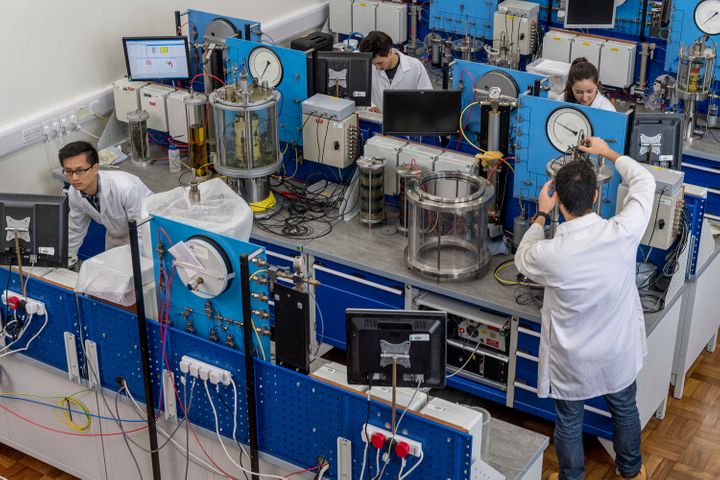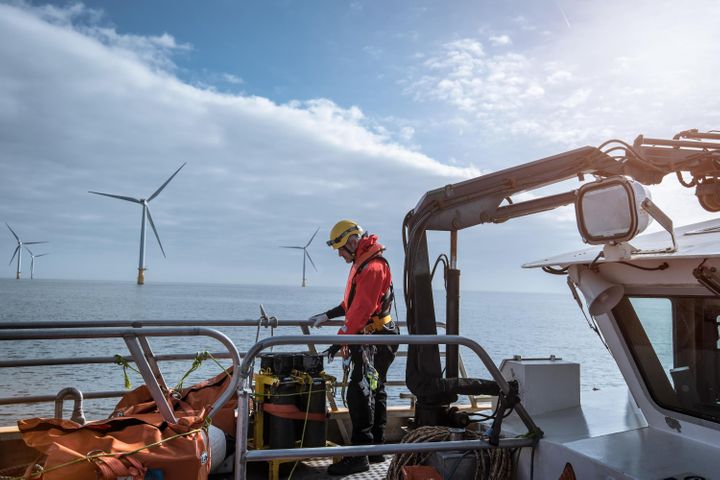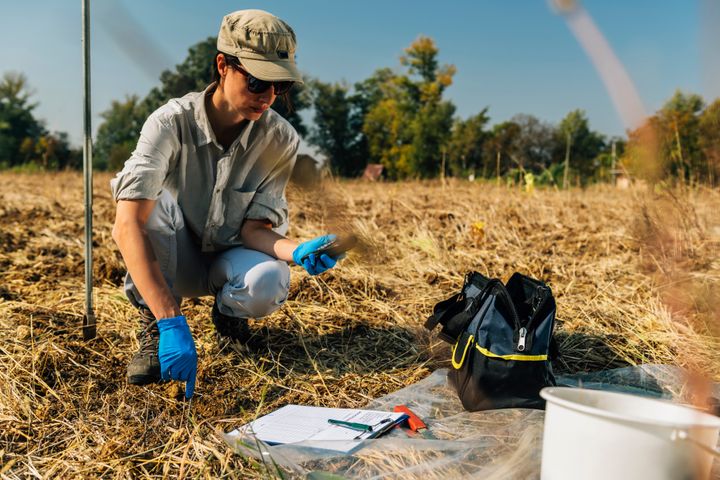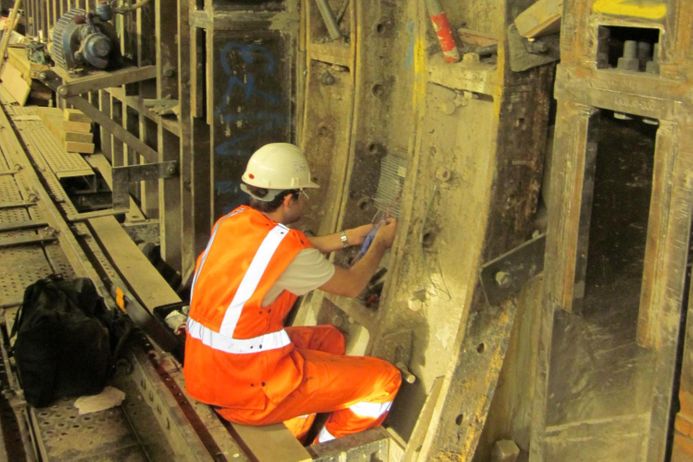The Geotechnics Section offers a prestigious portfolio of cutting-edge MSc courses in Geotechnical Engineering. Our programs prepare graduates to make impactful contributions across a range of transformative industries, including tunnelling, offshore wind, geothermal energy, infrastructure, and the foundations of iconic structures.
Key Information
Duration: 1 year (full-time), or 2 years (part-time)
Start date: September 2025
Applications open: Currently open
Fees: £18,500 (home) or £42,900 (overseas)
Location: South Kensington campus
ECTS: 90 CATS: 180
Our MSc in Geotechnical Engineering provides students with a solid foundation in the essential skills and knowledge required to excel as geotechnical specialists. In addition, we offer five highly focused MSc pathways that allow students to dive deeper into specific areas of geotechnical engineering: the MSc in Geotechnical and Earthquake Engineering, the MSc in Geotechnical and Geological Engineering, the MSc in Geotechnical and Geoenvironmental Engineering, the MSc in Geotechnical Engineering with Offshore Renewables, and the MSc in Geotechnical Engineering with Data Science (see below for further details).
These world-class postgraduate taught programs attract ambitious students with a background in civil engineering, mechanical engineering, geology, geophysics, earth sciences, and related fields. Each year, we welcome talented individuals from around the globe holding bachelor’s or master’s degrees (BEng, BSc, MEng, MSc) who are eager to advance their expertise and make a significant impact in the field.
Find the Geotechnics programme for you
Studying with us

Why Study Geotechnical Engineering?
An overview of the course structure, options, teaching, and assessment.
Watch Dr Katerina Tsiampousi, the former MSc Geotechnical Engineering course director, give an overview of the course structure, explain the course options, introduce our facilities, discuss our teaching and assessment approaches, highlight available scholarship opportunities, and outline post-graduation opportunities.

MSc Geotechnical Engineering with Data Science
Combine core geotechnical expertise with advanced data analysis.
This course combines core geotechnical expertise with advanced data analysis. Students gain a strong foundation in soil mechanics, laboratory testing, and geotechnical design while applying machine learning and statistical modeling to tackle engineering challenges in infrastructure, energy, and sustainability. With hands-on lab work, field trips, and industry links, this accredited program prepares graduates for rewarding and in-demand careers.

Meet MSc Graduate Alison Provost
MSc Graduate Alison Provost discusses her time as a Geotechnics MSc student at Imperial College.
MSc Graduate Alison Provost discusses her time as a Geotechnics MSc student at Imperial College.

Meet MSc Graduate Ana Isabel Pirrone
MSc Graduate Ana Isabel Pirrone on her time as a Geotechnics MSc student at Imperial College London
MSc Graduate Ana Isabel Pirrone on her time as a Geotechnics MSc student at Imperial College London.

Meet MSc Graduate Dr David Solans
MSc Graduate Dr David Solans on his time as a Geotechnics MSc student at Imperial College London
MSc Graduate Dr David Solans on his time as a Geotechnics MSc student at Imperial College London.

Meet MSc Graduate Serena Pak Chi Che
MSc Graduate Serena Pak Chi Che discusses her time as a Geotechnics MSc student at Imperial College
MSc Graduate Serena Pak Chi Che discusses her time as a Geotechnics MSc student at Imperial College.
Engaging section below video
Engaging section below video
Further information about MSc Geotechnical Engineering Programmes
We work closely with industry engineers to ensure our curriculum stays aligned with the evolving needs of geotechnical professionals. Industry leaders actively contribute to the program by:
- Delivering guest lectures
- Co-supervising MSc research projects and dissertations
- Offering scholarships through our industrial bursary scheme (current sponsors include Arup, Mott MacDonald, and Network Rail)
This program equips you with essential skills for Geotechnical Engineering, opening doors to careers in industry, government, or advanced research through a PhD. You'll gain the tools to excel and lead in your field, while networking with industry supporters—potentially securing job offers. Plus, you'll qualify for a post-graduation work visa.
Explore our alumni profiles to see where our graduates have taken their careers!
Programme layout:
Each MSc course comprises:
- Taught modules (including laboratory-based practicals)
- Presentations on prominent projects by industry experts
- A fieldwork module comprising 3 fieldtrips and
- A research project.
Our academic year is made up of three terms, each with a different emphasis:
- The first term has a theoretical emphasis.
- The second term is more design orientated.
- The final term is dedicated to research, so that you can really apply the knowledge you’ve gained.
What will I learn?
The programme will teach you a wide range of key skills that you can apply in geotechnical engineering design and analysis. The programme will cover theoretical concepts, problem solving tools, numerical methods, experimental techniques, geology, and design principles. These skills will be presented with an emphasis on Civil Engineering applications in geotechnical engineering. Networking, facilitated by our strong links with industry, along with the graduate visa that will be available to you, will provide you with opportunities to embark on the next step of your career.
Transferable skills will focus on technical writing, oral presentations and team working. These are complemented by courses offered by the Imperial College graduate school. We have designed our course to be complementary and teach a wide range of the skills required by modern engineers, whilst providing you with lots of exposure to design and research.
For further information on the programme layout and application requirements, please visit the relevant application page.
Modules by course
Select from the modules linked in the left hand column below to scroll directly to their description.
MSc Geotechnical Engineering
|
MSc Geotechnical Engineering and Offshore Renewables
|
MSc Geotechnical and Earthquake Engineering
|
MSc Geotechnical and Geoenvironmental Engineering
|
MSc Geotechnical and Geological Engineering
|
MSc Geotechnical Engineering with Data Science
|
|
|
Autumn term modules |
||||||
|
CIVE70027 Analysis and Constitutive Modelling |
Compulsory | Compulsory | Compulsory | Compulsory | Compulsory | Compulsory |
|
CIVE70022 Seepage and Consolidation |
Compulsory | Compulsory | Compulsory | Compulsory | Compulsory | Compulsory |
|
CIVE70026 Laboratory Testing and Data Interpretation |
Compulsory | Compulsory | Compulsory | Compulsory | Compulsory | Compulsory |
|
CIVE70028 Site Investigation and Engineering Geomorphology |
Compulsory | Compulsory | Compulsory | Compulsory | ||
|
CIVE70021 Strength and Deformation |
Compulsory | Compulsory | Compulsory | Compulsory | Compulsory | Compulsory |
|
CIVE70007 Geotechnical Hazards |
Compulsory | |||||
|
CIVE70024 Hydrogeology and Groundwater |
Compulsory | |||||
|
CIVE70023 Containment Engineering |
Compulsory | |||||
|
CIVE70116 Statistical Modelling |
Compulsory | |||||
|
CIVE70111 Machine Learning |
Compulsory | |||||
|
CIVE70123 Hydrodynamic Loading |
Compulsory | |||||
|
CIVE70126 Structural Dynamics |
Compulsory | |||||
|
Spring term modules |
||||||
|
CIVE70036 Geotechnical Infrastructure: Slopes and Embankments |
Compulsory | Compulsory | Compulsory | Compulsory | Compulsory | Compulsory |
|
CIVE70034 Design of Foundations and Retaining Structures |
Compulsory | Compulsory | Compulsory | Compulsory | Compulsory | Compulsory |
|
CIVE70029 Current Developments in Geotechnical Engineering |
Compulsory | Compulsory | Compulsory | Compulsory | Compulsory | Compulsory |
|
CIVE70033 Advanced Soil Mechanics |
Compulsory | Compulsory | Compulsory | |||
|
CIVE70032 Applied Numerical Analysis |
Compulsory | Compulsory | Compulsory | |||
|
CIVE70035 Geotechnical Processes and Field Monitoring |
Compulsory | Compulsory | Compulsory | Compulsory | ||
|
CIVE70030 Rock Engineering |
Compulsory | Compulsory | ||||
|
CIVE70037 Geotechnical Earthquake Engineering |
Compulsory | |||||
|
CIVE70031 Contaminated Land and Groundwater |
Compulsory | Compulsory | ||||
|
CIVE70089 Design Project: Data Science - Geotechnics |
Core | |||||
|
CIVE70112 Data Engineering |
Compulsory | |||||
|
CIVE70124 Offshore Geotechnical Engineering |
Compulsory | |||||
|
CIVE70125 Design Project: Offshore Renewables |
Core | |||||
|
Additional requirements |
||||||
|
CIVE70025 Geotechnics Fieldwork |
Compulsory | Compulsory | Compulsory | Compulsory | Compulsory | Compulsory |
|
CIVE70038 Research Project - Geotechnics |
Core | Core | Core | Core | Core | Core |
Module details and descriptions
Autumn term modules
CIVE70027 Analysis and constitutive modelling
Module descriptor: This module presents the theory behind methods of analysis available for geotechnical design. It aims to arm you with the background knowledge to understand assumptions behind different methods, to use them at appropriate stages of geotechnical design and to assess the credibility of the results. Initial focus is on classical methods of analysis and understanding of equilibrium and compatibility requirements in the context of soil continuum. Advanced numerical analysis focuses on the finite element method, introducing the theory common to the modelling of linear elastic solids. You will consider extensions of this theory to enable its application in geotechnical analysis, including nonlinear solvers, hydro-mechanical coupling, boundary conditions, structural elements and soil constitutive models.
- Assessment: written examination
- EACTS: 5; CATS: 10
CIVE70022 Seepage and Consolidation
Module descriptor: This module supports your development of understanding of the flow of water in soil strata under both steady state conditions (seepage) and transient conditions (consolidation). The module is organised so that after a comprehensive discussion of steady stage flow you will consider the transient case of consolidation in low permeability soils. Starting from a review of fundamental concepts such as head, the module evolves to consider the governing equations necessary to solve realistic engineering problems. Interactive laboratory demonstrations will further develop your understanding. Permeability of soil and the factors that influence it will be discussed. Graphical, numerical and analytical approaches to solve boundary value problems are considered. You will learn how to make and interpret flownets. By using finite differences you will learn how to numerically solve both the steady state seepage equation in two dimensions and the consolidation equation in one dimension.
- Assessment: written examination & coursework
- EACTS: 5; CATS: 10
CIVE70026 Laboratory Testing and Data Interpretation
Module descriptor: You will learn the fundamentals of the design of rigorous geotechnical laboratory testing programmes, and develop the critical skill and ability to recognise and assess experimental errors. You will get a good understanding of the comprehensive range of geotechnical laboratory tests, from basic manually-operated devices to advanced computer-controlled apparatus. While learning to appreciate the broad range of boundary conditions used in research and engineering practice, you will gain fundamental knowledge of the critical issues related to the collection and interpretation of laboratory testing data, and will develop skills through worked examples, statistically-sound data analyses and a practical experimental exercise on soil consolidation.
- Assessment: written examination, practical & coursework
- EACTS: 5; CATS: 10
CIVE70028 Site Investigation and Engineering Geomorphology
Module descriptor: Module Overview and Content The module aims to provide you with an in-depth understanding of Site Investigation techniques and how they can be used within the context of the geological and geomorphological setting to reduce uncertainty in the subsurface. The module will develop an understanding of procurement and programme planning. Introduce Site Investigation techniques including the geological characteristics of soils and rocks, as materials and en-masse, and explain their influence upon the engineering behaviour of these materials. This then leads into geomorphological landform processes and geohazards, before considering inherent uncertainty and mitigation methods.
- Assessment: written examination, practical & coursework
- EACTS: 5; CATS: 10
CIVE70021 Strength and Deformation
Module descriptor: This module builds upon basic principles of soil mechanics (principle of effective stress, shear strength of soils) in order to establish modern frameworks for describing the behaviour of clays and sands under a variety of loading conditions using Critical State Soil Mechanics theory. The idealised soil behaviour is compared to that of natural soils and systematic approaches to explain and quantify these differences are established. Throughout the module, emphasis is placed on characterising soil response and how this information can be used in practical engineering design.
- Assessment: written examination
- EACTS: 5; CATS: 10
CIVE70007 Geotechnical Hazards
Module descriptor: This module will introduce you to the main geotechnical hazards (landslides, volcanoes, tsunamis and earthquakes) and their potential damaging effects to the built environment, as well as to fundamental elements of engineering seismology, seismic hazard assessment and soil dynamics. It will enable you to use hazard assessment as a generic tool which can be applied to all types of geohazards and to develop a fundamental understanding of how ground conditions can modify the surface seismic motion.
- Assessment: written examination
- EACTS: 5; CATS: 10
CIVE70024 Hydrogeology and Groundwater
Module descriptor: Geology provides the canvass on which a hydrological picture is painted. Understanding rocks and their role in shaping the structure of the landscape is fundamental to understanding a catchment’s hydrological response. The module will enable you to explain the key concepts in hydrogeology related to the movement, storage and quality of groundwater. You will derive models to explain the behaviour of groundwater and use them to manage this important water resource.
- Assessment: written examination and coursework
- EACTS: 5; CATS: 10
CIVE70023 Containment Engineering
Module descriptor: Content Containment is a critical engineering practice which is widely used where waste or detritus are being discarded. Its function is critical for the protection of public health and the environment. In this module you will be introduced to key factors required for the safe containment of material, including: Waste degradation processes, the challenges of in-ground waste disposal and the geological aspects of landfill design required to limit potential environmental impacts; Properties and function of liners, barriers, landfill site hydrogeology, gas control and monitoring; Critical technical design requirements of containment systems, the legislative framework associated with containment systems
- Assessment: written examination and coursework
- EACTS: 5; CATS: 10
CIVE70116 Statistical Modelling
Module descriptor: This module will provide you with a comprehensive understanding of statistical modelling fundamentals from a theoretical and applied viewpoint. It will develop the relevant theory, methodology and computational techniques required for you to formulate and implement statistical models to represent real-world phenomena. The course will also teach you how to program statistical models in the R programming language using both R and the RStudio graphical user interface (GUI). A pre-requisite for this course is that you must have a sufficient background in mathematics, including algebra, matrix algebra, and multivariate calculus.
- Assessment: written examination and coursework
- EACTS: 5; CATS: 10
CIVE70111 Machine Learning
Module descriptor: This module will provide you with a comprehensive understanding of machine learning concepts and their application to civil engineering applications. It will cover the three principal subfields of modern machine learning, (i) supervised learning, including regression and classification, (ii) unsupervised learning methods, such as clustering, Markov Chain Monte Carlo, and Bayesian networks; and (iii) reinforcement learning and its applications in uncertain and sequential problem contexts. Application examples will be drawn from a broad range of civil engineering applications. The module will also teach you how to implement machine learning models using the Python programming language, using common numerical analysis libraries (such as NumPy), and specialised tools, such as skikit-learn and PyTorch.
- Assessment: written examination and coursework
- EACTS: 5; CATS: 10
CIVE70123 Hydrodynamic Loading
Module descriptor: The purpose of this module is to provide a comprehensive course in the fundamentals of hydrodynamic loading relevant to structures in an offshore environment. The module (i) introduces you to commonly applied linear and non-linear wave theories used in design standards, (ii) explains the theory that underpins them, (iii) highlights their range of validity, (iv) estimates their associated accuracy and (v) emphasizes those situations in which the underlying physics dictates their application. Having introduced these wave theories and models, the module then provides a fundamental understanding of the resultant fluid loading on structures.The content will (i) provide you with a fundamental understadning of fluid loading, (ii) explore the various flow regimes within which different loads arise (iii) explain the esential physics that govern the application of these loads, (iv) help you appreciate simplifying assumptions on which commonly applied design solutions are based and (v) teach you how to assess the accuracy of calculated loads.
- Assessment: written examination and coursework
- EACTS: 5; CATS: 10
CIVE70126 Structural Dynamics
Module descriptor: This module provides you with a general grounding in the basic concepts and principles of structural dynamics, which forms part of the integrated load analysis in Offshore Renewables. It introduces the most common dynamic phenomena in structural engineering and trains students in the idealization of dynamic phenomena, their analytical formulation and their mathematical solution.
- Assessment: written examination
- EACTS: 5; CATS: 10
Spring term modules
CIVE70036 Geotechnical Infrastructure: Slopes and Embankments
Module descriptor: This module provides you with in-depth understanding of the geotechnical characteristics of slopes and embankments. You will learn to classify fundamental mechanisms that underpin landslides, considering both geomorphological and geotechnical criteria. You will be introduced to slope stability analysis principles, using the limit equilibrium method and making reference to finite element applications. You will be taught how to apply various slope stabilisation methods and learn from selected case studies of slope failures. In relation to embankments, you will learn to classify types of fills, their origin and compaction and understand their effect on fill behaviour, and that the development of lateral earth pressures and the effect of soil-atmosphere interaction are key to the stability and serviceability of embankments. Finally, you will learn to assess the influence of the foundation soil (stiff and soft clay foundations).
- Assessment: written examination and coursework
- EACTS: 5; CATS: 10
CIVE70034 Design of Foundations and Retaining Structures
Module descriptor: This module will teach you how to design foundations and earth-retaining structures, solving typical geotechnical soil-structure interaction problems. Initial focus is on types of foundations and retaining walls and their design requirements. You will learn to predict bearing capacity and settlements of foundations, and correctly estimate earth pressures and displacements of retaining structures. Using design codes, you will focus on limit states of (1) shallow and deep foundations and (2) gravity walls, embedded cantilever and multi-propped/anchored walls. Using numerical methods, you will focus on the effects of (3) geometry of pile groups/rafts (foundations), and (4) wall stiffness, positions of props, prop loads and bending moments (retaining structures).
- Assessment: n/a
- EACTS: 0; CATS: 0
CIVE70029 Current Developments in Geotechnical Engineering
Module descriptor: This module comprises a series of lectures given by Industry to our MSc students in the Spring Term. Experts from industry share their hands-on experience and present prominent projects from all over the world. A wide variety of subjects will be covered, depending on the list of lecturers and their experience and expertise. The topics will involve Site investigation and Geophysics, Environmental Geotechnics, Engineering Seismology and application of numerical methods on practical design problems.
- Assessment: n/a
- EACTS: 5; CATS: 10
CIVE70033 Advanced Soil Mechanics
Module descriptor: This module covers soil response considering advanced material behaviour and more complex external conditions. Historically, the subject of soil mechanics developed for static loads and for saturated conditions, where just the two phases of solid and water were relevant to many applications, especially in temperate climates. However, in many environments the water table is deep below the ground surface and the soil above it is not fully saturated (compacted fills are also unsaturated). The air phase has important implications on the soil response. Also cyclic loading (think of offshore), effect of creep and shearing rates on small strain stiffness, and the behaviour and modelling of particulate soils (discrete element method, DEM) are relevant, and therefore addressed in this module.
- Assessment: written examination
- EACTS: 5; CATS: 10
CIVE70032 Applied Numerical Analysis
Module descriptor: During this module you will discuss, prepare and run a Finite Element (FE) analysis of a geotechnical problem combining shallow foundations, tunnel excavations, deep excavations with retaining walls and piles, in a London stratigraphy and in a hydro- mechanically coupled analysis. You will discuss a new stage of the analysis in every session (theory) and run an appropriate Finite Element Program (practice). You will compare between numerical and analytical solutions (also obtained with the appropriate software).
- Assessment: written examination
- EACTS: 5; CATS: 10
CIVE70035 Geotechnical Processes and Field Monitoring
Module descriptor: There are many forms of ‘geotechnical processes’ ranging from tunnelling and deep excavations to ground improvement techniques. The module covers a wide range of these encompassing aspects from design and analysis to the practicalities involved. Detailed case studies are drawn on throughout to illustrate the methods and the ground response to them. Field monitoring is needed to assess both ground and structural response and is becoming a major component in many large-scale infrastructure projects. Techniques for monitoring surface and subsurface displacements, pore water pressures and stresses are described and discussed in detail and illustrated through the data presented in the case studies. The importance of monitoring in relation to the Observational Method is also explained.
- Assessment: coursework
- EACTS: 5; CATS: 10
CIVE70030 Rock Engineering
Module descriptor: Engineering rock mechanics is the study of both rock mechanics and rock engineering, and is concerned with all structures that are built in or on rock. This includes structures formed from the rock itself, such as slopes and caverns, as well as engineering structures such as tunnels and foundations. This module is an introduction to the subject, and aims to familiarise you with the principal concepts and techniques used in the discipline, whilst indicating more advanced issues. Through a series of weekly lectures and practical sessions you will have the opportunity to apply theory to practical real world engineering problems.
- Assessment: written examination, practical, and coursework
- EACTS: 5; CATS: 10
CIVE70037 Geotechnical Earthquake Engineering
Module descriptor: This module aims to provide you with the background necessary to understand the response of geotechnical structures under seismic loading and to appreciate the fundamental principles which underpin their seismic design. The module focuses on fundamental soil behaviour under seismic loading, analytical and numerical tools for seismic geotechnical analysis and related applications in site response analysis, retaining structures and piled foundations.
- Assessment: written examination and coursework
- EACTS: 5; CATS: 10
CIVE70031 Contaminated Land and Groundwater
Module descriptor: Human behaviour has a legacy of contamination in soil and groundwater. This contamination poses a risk to water resources and the natural environment. Many of these pollutants are organic and can be hazardous even at low concentrations. In this module you will learn about the processes that govern the behaviour of pollutants in the subsurface and the mathematical models used to simulate these. You will also be taught how to undertake a risk-based assessment of a site and, if needed, the decision making process, based environmental economics, for its remediation. In addition you will benefit from having over half of the lectures given by external experts with many years of practical experience.
- Assessment: written examination
- EACTS: 5; CATS: 10
CIVE70089 Design Project: Data Science - Geotechnics
Module descriptor: The module involves student groups working together to apply machine learning and/or statistical modelling methods to solve a design or operational problem for applications within geotechnical engineering. Basic information concerning the scope and context of the engineering problem/application will be provided at the module commencement via a project brief document. The project briefs will consider one or more geotechnical engineering applications, and will be prepared in collaboration with industry partners and/or advisors.
- Assessment: coursework
- EACTS: 5; CATS: 10
CIVE70112 Data Engineering
Module descriptor: In this module you will cover: Introduction to machine learning in the Python programming language; Applications of standard machine learning libraries to solve civil engineering problems; Reinforcement learning; Computer vision principles; Developer environments, version control and cloud-based computing; Visual analytics and data modelling; Database development. This module will provide you with practical experience in constructing and validating models and algorithms and the necessary advanced computational skills to enable you to apply this knowledge to solving a range of complex civil engineering problems. The module includes: (1) construction, implementation, and validation of machine learning algorithms; (2) deployment of advanced machine learning libraries to solve complex problems from a broad range of civil engineering applications; (3) coverage of different machine learning approaches; (4) the operation of developer environments; (5) database development; and (6) advanced data manipulation and data visualisation techniques. The module will be taught using the Python programming language and will build upon a broad range of established modelling libraries.
- Assessment: coursework
- EACTS: 5; CATS: 10
CIVE70124 Offshore Geotechnical Engineering
Module descriptor: In this module you will cover: Week 1: Introduction - The offshore environment. Week 2: Offshore geophysical surveys, site investigations and geohazards Week. 3: Behaviour of seabed sediments. Week 4: Pipelines, flowlines, cables and riser geotechnics. Week 5: Mobile jack-up platforms / spudcans. Week 6: Gravity base or shallow foundations. Week 7: Piled foundations and pile driveability. Week 8: Anchoring systems. Week 9: Suction caissons. Week 10: Land reclamation and environmental aspects. This module will delve into the current techniques used in site geotechnical and geophysical exploration, soil characterisation, and basic design approaches for a number of foundation elements often used in offshore structures, such as suction caissons, piles, anchors and spudcans, as well as elements of pipeline geotechnics.
- Assessment: examination
- EACTS: 5; CATS: 10
CIVE70125 Design Project: Offshore Renewables
Module descriptor: You will undertake the project in small student groups in a collaborative effort to address a design or operational challenge within the offshore renewables sector. At the outset of the module, you will receive a comprehensive project brief outlining the scope and context of the engineering issue or application. This project brief will integrate various engineering dimensions, necessitating interdisciplinary knowledge. It will be developed in conjunction with our industry partners and advisors, ensuring relevance and real-world application. The design project culminates in an oral presentation from each group in which you will communicate your findings to an industrial client.
- Assessment: coursework
- EACTS: 5; CATS: 10
Additional requirements
CIVE70025 Geotechnics Fieldwork
Module descriptor: The module includes three separates fieldtrips spaced through the academic year which will provide you with the opportunity to develop geotechnical skills in the natural environment. You will gain unique first hand experience of real world rock/soils, geological setting, geohazards and construction projects. The fieldwork will introduce you to safe working in unusual and potentially hazardous environments. This module is an introduction to fieldwork, and aims to familiarise you with the principal concepts and practical experience in geotechnical fieldwork setting.
- Assessment: coursework
- EACTS: 5; CATS: 10
CIVE70038 Research Project - Geotechnics
Module descriptor: Module Overview and Content The aim of the Research Project is to undertake a specific piece of independent research in the form of a critical review, a laboratory- or field-based experimental investigation, or a modelling/numerical analysis project. The project and the results will be reported in a research dissertation.
- Assessment: coursework
- EACTS: 30; CATS: 60
Contact the Education Office
For current students, prospective students, applicants, and offer holders regarding: questions and advice relating to MSc application, basic eligibility, supporting documentation required, and information on entry to our postgraduate taught (MSc) programmes, and general information pre-registration.
Tel: +44 (0)207 594 5932
Email: cvpgo@imperial.ac.uk
Contact the Programme Director (Dr Ken Vinck)
For all queries related to the academic content of the programme.
Email: ken.vinck15@imperial.ac.uk
Contact the Programme Administrator (Jess O'Toole)
For all other queries.
Email: j.otoole@imperial.ac.uk



.jpg)
.jpg)

.jpg)



